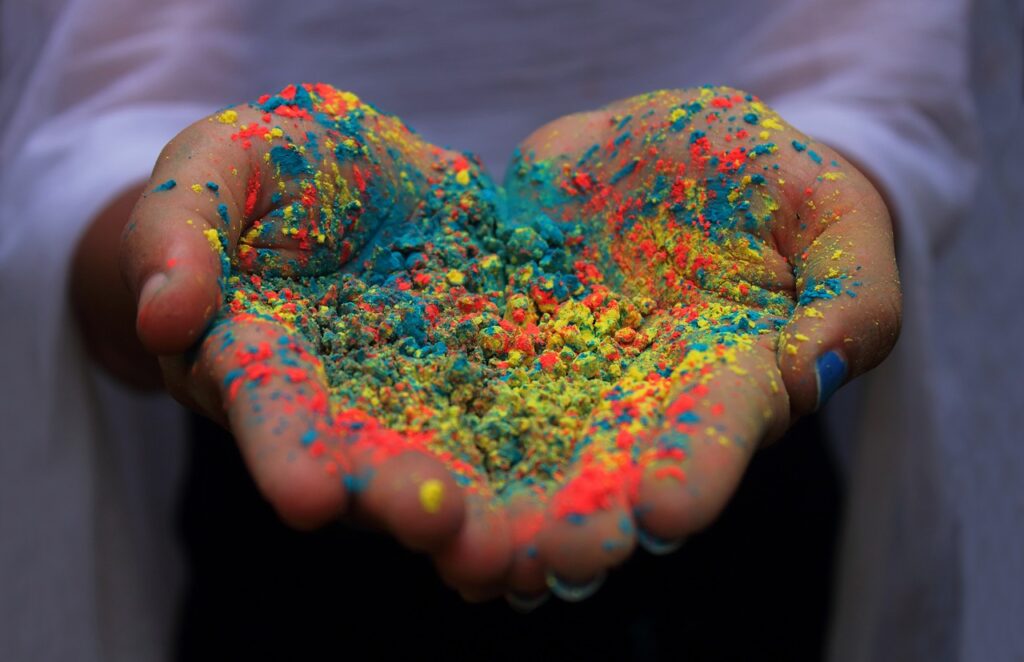
What are Cultural Festivals in India During Winter?
In the winter months, India comes alive with vibrant cultural festivals. These celebrations showcase the country’s rich diversity and heritage. Cultural festivals in India during winter are a captivating tapestry of colors, lights, and customs, and this blog post will take you on a captivating journey. From the Festival of Lights, Diwali, to the riotous celebration of colors during Holi, India’s winter season is a time of joyful gatherings and spiritual reflection.
Diwali is One of Many Cultural Festivals in India During Winter
Diwali, also known as the Festival of Lights, is one of India’s most celebrated and cherished festivals. This festival typically falls in October or November and marks the triumph of light over darkness and good over evil.
During Diwali, homes and streets are adorned with oil lamps, candles, and colorful decorations, creating a mesmerizing spectacle. Families come together to clean and decorate their houses, exchange gifts, and prepare delicious sweets and snacks.
The heart of Diwali lies in its cultural and religious significance. It is celebrated to honor Lord Rama’s return to Ayodhya after defeating the demon king Ravana. The lighting of lamps symbolizes the triumph of light over darkness and the victory of righteousness.
Diwali celebrations vary across different regions of India, each adding its unique flavor to the festival. In North India, it’s common to witness grand fireworks displays and the worship of Goddess Lakshmi, the Hindu goddess of wealth. In South India, Diwali often includes the worship of Lord Krishna and a display of beautiful kolam (rangoli) patterns.
One of the most anticipated aspects of Diwali is the bursting of firecrackers, which fills the night sky with dazzling colors and sounds. The atmosphere is electric, and the streets come alive with excitement.
Travelers during Diwali can expect to be warmly welcomed into Indian homes, experiencing the festival’s true essence through the eyes of locals. It’s a time of unity, joy, and spreading positivity, making it a fantastic cultural experience for anyone visiting India during the winter season.
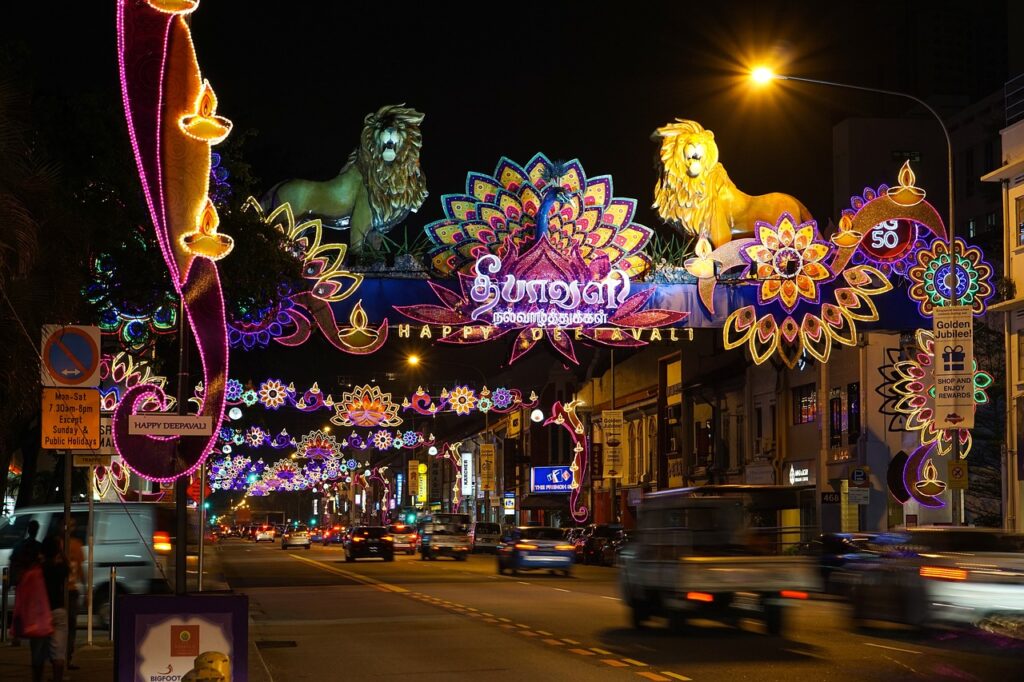
The Vibrant Colors of Holi
Holi, often referred to as the Festival of Colors, is another splendid cultural festival celebrated with enthusiasm and fervor in India, typically in March. This joyous occasion marks the arrival of spring and the victory of good over evil.
The most iconic aspect of Holi is the throwing of colored powders and water balloons, turning the streets and people into a riot of colors. It’s a day when everyone is fair game, and strangers join in the fun without hesitation.
Holi has its roots in Hindu mythology, particularly the legend of Prahlad and Holika. The festival commemorates the triumph of Prahlad’s devotion to Lord Vishnu over the evil Holika, who tried to burn him alive. This story is often reenacted in the form of bonfires and effigy burnings the night before Holi, known as Holika Dahan.
One of the fascinating aspects of Holi is how it’s celebrated differently in various parts of India. In Mathura and Vrindavan, the birthplace of Lord Krishna, Holi is a week-long celebration with traditional songs and dances. In the state of Punjab, it’s known as Hola Mohalla, where martial arts displays and mock battles take center stage.
Holi transcends barriers of age and social status. On this day, it’s common to see people from all walks of life coming together, forgetting their differences, and reveling in the spirit of togetherness.
Holi offers a unique opportunity to immerse themselves in Indian culture and share unforgettable moments with locals. It’s a festival that engages all your senses, from the vibrant colors and joyful music to the delectable sweets and snacks prepared for the occasion. If you’re in India during March, don’t miss the chance to be a part of this exuberant and colorful celebration.
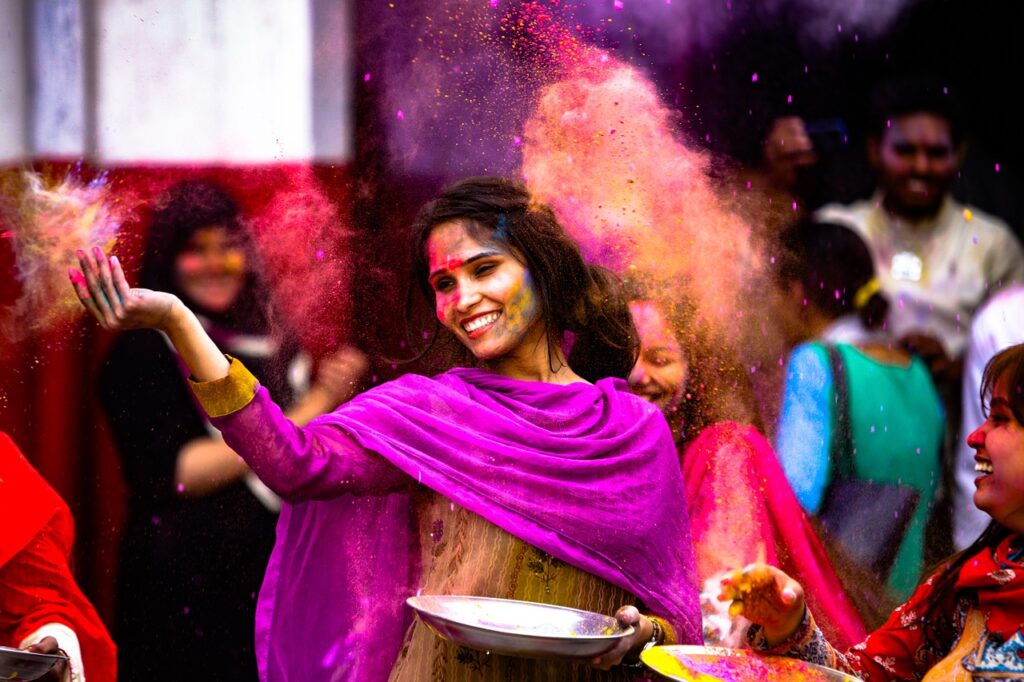
The Spiritual Journey of Christmas in Goa
While Christmas is celebrated worldwide, experiencing this festive season in Goa, India, is a unique and spiritually enriching experience. Goa’s Christmas celebrations are a harmonious blend of Indian and Western traditions, creating a magical atmosphere unlike anywhere else.
Goa, known for its beautiful beaches and laid-back vibe, transforms into a wonderland of lights and decorations during Christmas. The state’s Christian population, a significant part of Goa’s demographics, plays a vital role in these celebrations.
One of the highlights of Christmas in Goa is the beautifully adorned churches. The most famous one is the Basilica of Bom Jesus in Old Goa, a UNESCO World Heritage Site, where a midnight Mass is celebrated with great fervor. The church’s interior is resplendent with festive decorations, and the Mass is attended by both locals and tourists.
The streets of Goa come alive with Christmas markets and processions. You can shop for unique handicrafts, ornaments, and local sweets at these markets, making it an excellent opportunity for souvenir hunting.
Goan cuisine during Christmas is a delectable treat. You can savor traditional dishes like Bebinca, a rich Goan dessert, and Sorpotel, a spicy pork dish. Local bakeries also prepare mouthwatering Christmas sweets like Neureos and Dodol.
Christmas in Goa is not just about celebrating within the Christian community; it’s a time when people of all backgrounds come together to enjoy the festive spirit. You’ll often find Hindu temples and Muslim households joining in the celebrations, symbolizing India’s unity in diversity.
Christmas in Goa offers a serene and spiritually uplifting experience. Whether you attend a midnight Mass, stroll through the beautifully lit streets, or simply relax on the beaches, you’ll find a sense of peace and unity that transcends cultural and religious boundaries. It’s a magical time to witness the true essence of Goa’s multicultural identity and the universal message of love and goodwill.
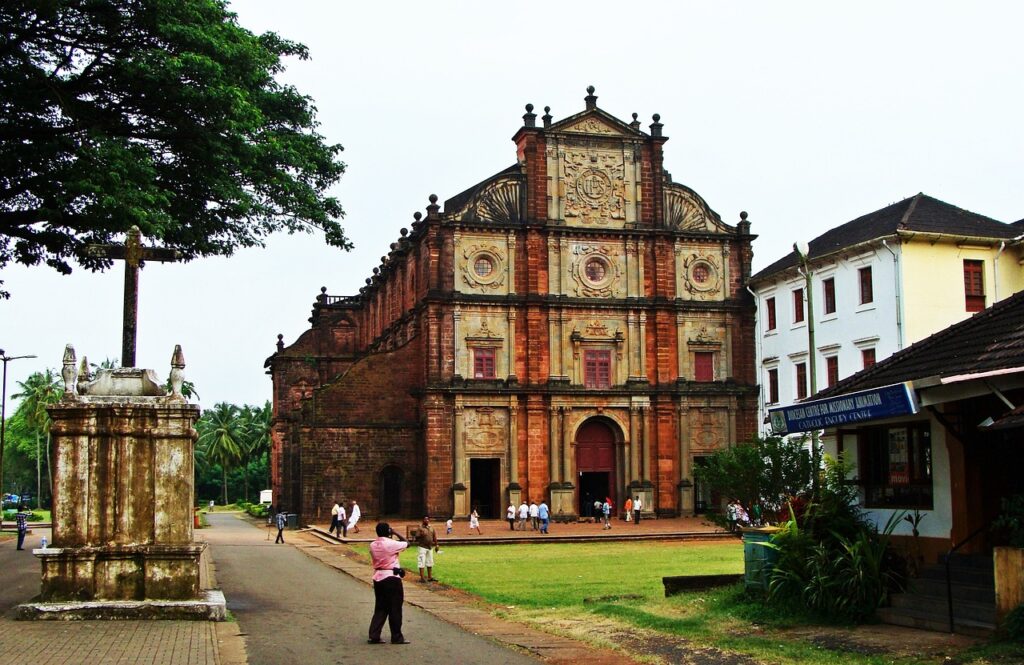
The Traditional Elegance of Pongal
Pongal is a charming and culturally significant festival celebrated predominantly in the southern Indian state of Tamil Nadu, typically in mid-January. This harvest festival is a tribute to nature’s bounty and a thanksgiving for a successful agricultural season.
The word “Pongal” itself means “boiling over” or “overflowing,” and it signifies abundance and prosperity. The festival lasts for four days and is filled with rituals and celebrations.
The most iconic aspect of Pongal is the preparation of a special dish called “Pongal.” It’s a sweet rice dish made from freshly harvested rice, jaggery (unrefined sugar), milk, and a medley of spices and nuts. The act of allowing the Pongal dish to boil over is considered auspicious and a symbol of good fortune.
Pongal is not just about cooking; it’s also about paying tribute to the Sun God. On the second day of the festival, known as “Surya Pongal,” people worship the Sun, offering thanks for the sunlight that nourishes their crops.
The third day, “Mattu Pongal,” is dedicated to cattle, which play a vital role in agriculture. Cattle are bathed, decorated, and given special treats as a sign of gratitude for their hard work in the fields.
The final day, “Kaanum Pongal,” involves visiting friends and family, as well as enjoying outdoor activities. It’s a time for people to come together, exchange gifts, and celebrate their bond.
Pongal showcases the deep connection between agriculture, nature, and culture in South India. The colorful Kolam (rangoli) patterns adorning doorsteps and the traditional attire worn during the festival add to the festive atmosphere.
Pongal offers a chance to witness the beauty of rural South India, experience its agrarian traditions, and savor the delectable Pongal dish. The warmth and hospitality of the Tamil people make it a heartwarming cultural experience.
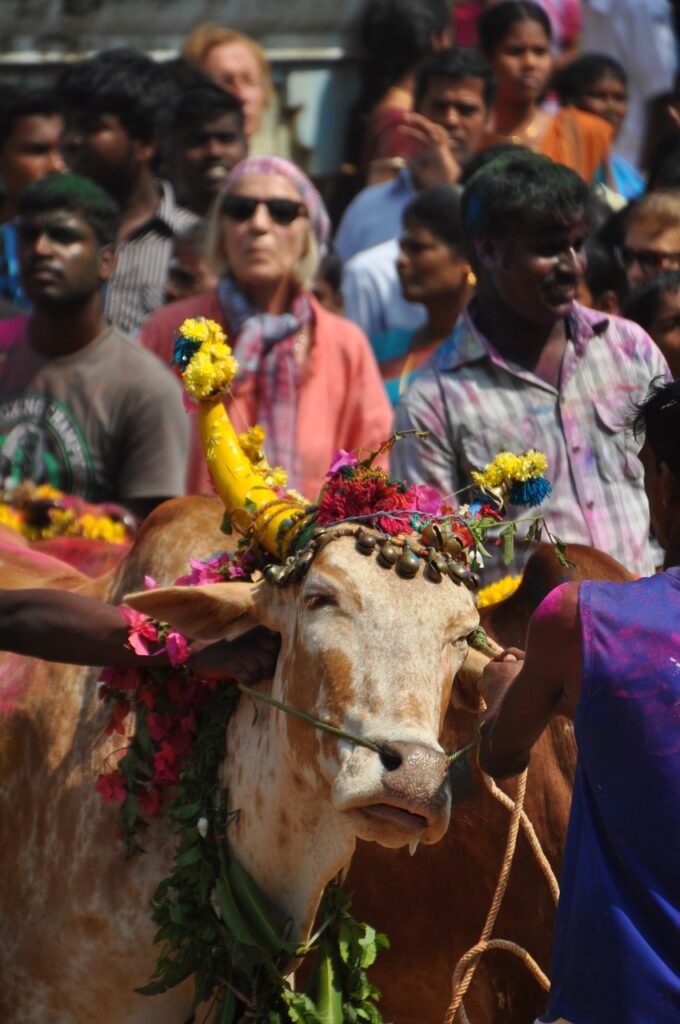
Rann Utsav in Gujarat is a Mesmerizing Cultural Festivals in India During Winter
Rann Utsav is a grand cultural festival celebrated in the vast and captivating white desert of Kutch, Gujarat. This extravaganza typically takes place from October to February, coinciding with the winter months when the arid salt marshes of the Rann of Kutch transform into a mesmerizing, otherworldly landscape.
The centerpiece of Rann Utsav is the stunning white desert, which stretches as far as the eye can see. The full moon nights are particularly enchanting when the salt crystals on the ground shimmer in the moonlight, creating a surreal atmosphere.
The festival is a celebration of Gujarat’s rich art, craft, music, dance, and culture. Visitors can witness a kaleidoscope of performances, including traditional folk dances like Garba and Raas, as well as live music and cultural shows. The folk artists and artisans from across Gujarat come together to showcase their talent and crafts.
One of the festival’s highlights is the opportunity to stay in the luxurious tent city of Dhordo. These tents offer a unique glamping experience in the midst of the desert. Waking up to the serene desert landscape is a memory that will last a lifetime.
Rann Utsav also offers a chance to indulge in Gujarati cuisine, known for its diversity and flavor. Savor local delicacies like Dhokla, Khandvi, and traditional sweets like Jalebi and Fafda.
To add to the adventure, camel safaris across the white desert, visits to nearby villages, and bird-watching expeditions are offered. The Kutch region is known for its rich biodiversity, making it a haven for nature enthusiasts.
Rann Utsav is a celebration of art, culture, and nature against the backdrop of a surreal desert landscape. It’s an immersive experience that allows travelers to delve into the heart of Gujarat’s traditions and hospitality.
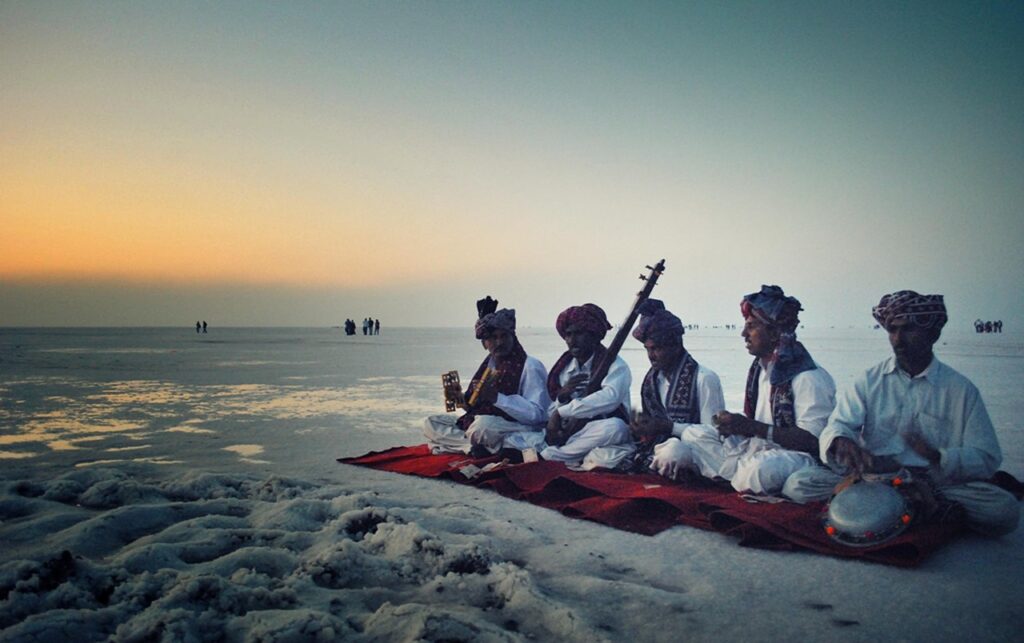
The Serene Devotion of Christmas in Kerala
Kerala, often referred to as “God’s Own Country,” offers a serene and spiritually enriching experience during the Christmas season. While Christmas is celebrated worldwide, Kerala adds its unique charm to this festive occasion, making it a peaceful and soulful celebration.
Christmas in Kerala is a harmonious blend of Christian traditions and the state’s own cultural richness. The celebration starts with the decoration of churches, with beautifully lit stars and festive ornaments adorning the interiors and exteriors. Attending the Midnight Mass in one of Kerala’s picturesque churches is a serene experience.
Kerala is known for its warm hospitality, and during Christmas, this warmth extends to travelers as well. You’ll often find yourself welcomed into local homes, where you can witness the preparations for the grand feast that awaits on Christmas day.
The highlight of Christmas in Kerala is undoubtedly the traditional Kerala Sadya, a sumptuous vegetarian feast served on a banana leaf. This elaborate meal includes a variety of dishes, each bursting with flavors and spices. Don’t miss trying the mouthwatering appams, stew, and a wide array of delectable desserts.
Another charming aspect of Kerala’s Christmas celebrations is the carol singing, where groups of children and adults visit homes and churches to spread the festive spirit through songs and hymns.
Kerala’s natural beauty, with its backwaters, lush greenery, and serene beaches, provides the perfect backdrop for a peaceful Christmas getaway. You can take boat rides in the tranquil backwaters, relax on the pristine beaches, or explore the vibrant local markets for unique Christmas gifts.
Christmas in Kerala is not just a religious celebration but a cultural and community-oriented event. It’s a time when people of all backgrounds come together to share in the spirit of love, harmony, and devotion. If you’re seeking a serene and spiritually fulfilling Christmas experience, Kerala is the perfect destination to discover the essence of this festive season.
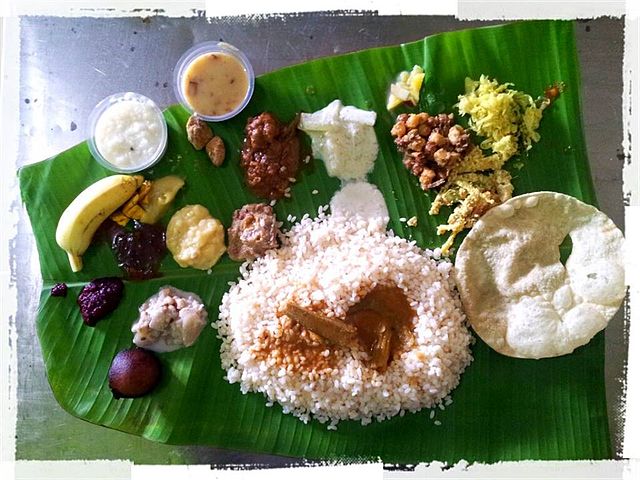
As you plan your visit to India during the winter season, remember that these festivals offer not just a glimpse into India’s rich heritage but also an opportunity to connect with its warm and welcoming people. Whether you’re a spiritual seeker, an art and culture enthusiast, or simply someone looking for a unique travel experience, India’s winter festivals promise to be a journey of a lifetime.
